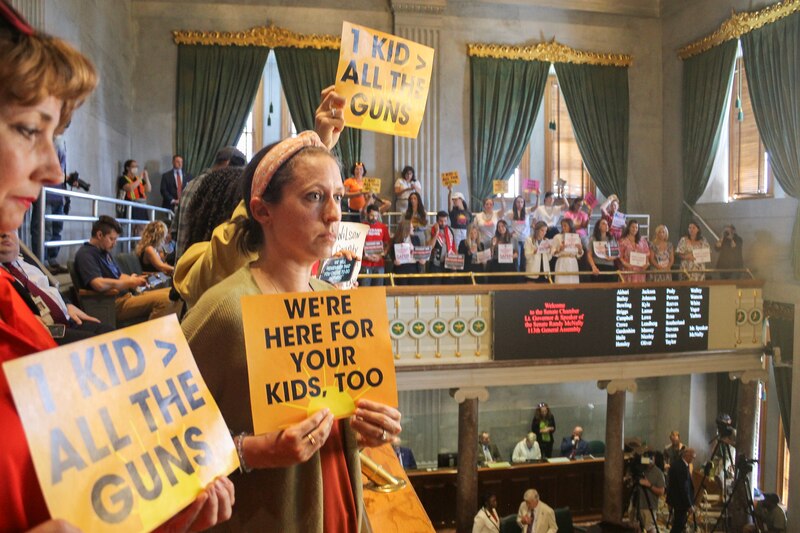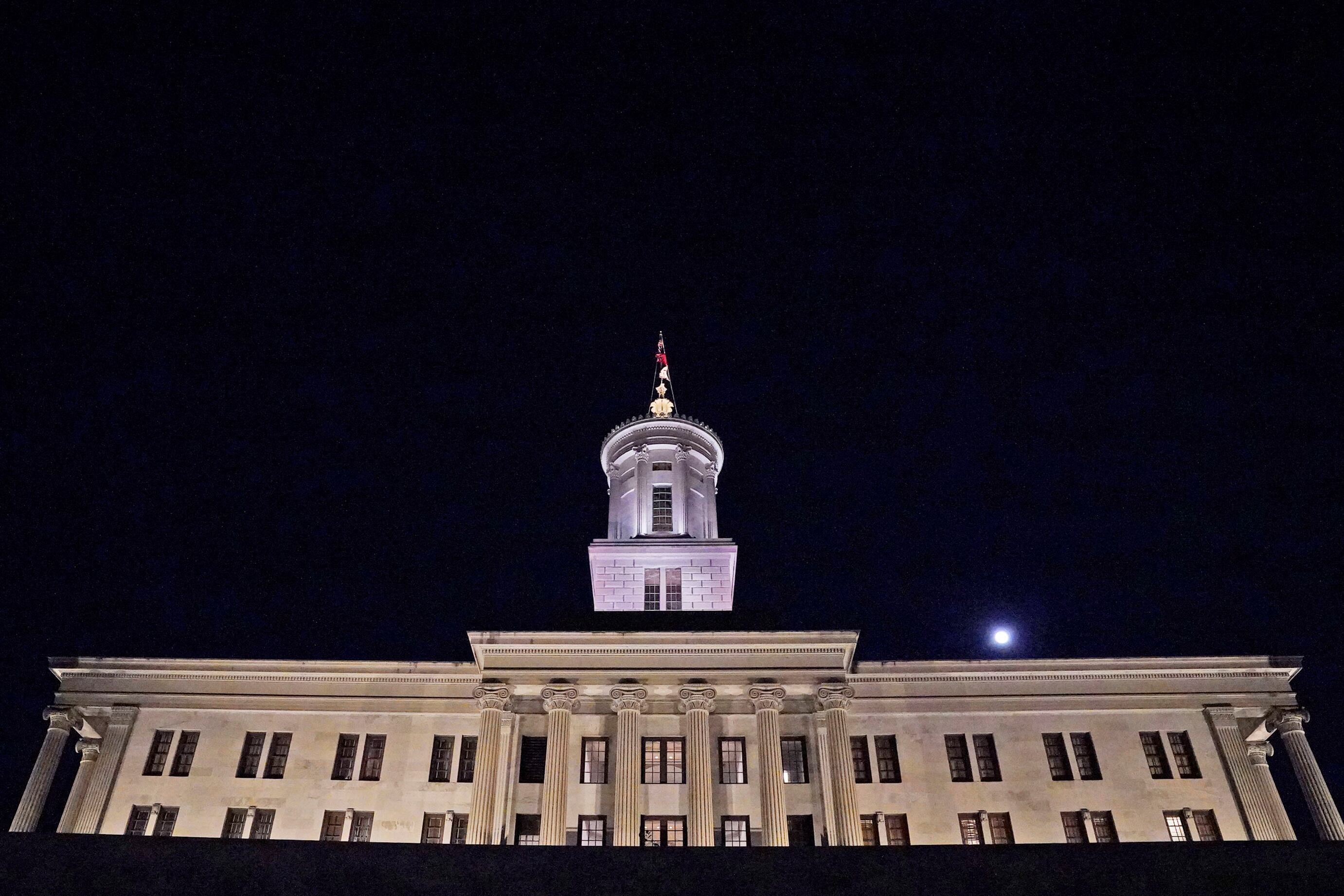Chalkbeat is a nonprofit news organization covering public education in communities across America. Sign up for our free Tennessee newsletter to keep up with state education policy and the Shelby County public school system.
Five years after a bruising legislative battle opened the door to private school vouchers in parts of Tennessee, lawmakers are preparing to take up a controversial bill to create a similar program statewide.
Gov. Bill Lee’s universal voucher proposal, which eventually would make all K-12 students eligible to use public funding to attend a private or home school, is expected to dominate debate after the 113th General Assembly reconvenes on Tuesday.
But other issues affecting students and educators are sure to emerge in a state where education reform has been front and center since 2010, when Tennessee won $500 million in the federal Race to the Top competition to jumpstart changes.
And if the last few years are any indication, a few surprises may surface in the months ahead. Politics and tragedy have shaken up the education priorities of several recent sessions, from an 11th-hour Republican drive in 2021 to restrict classroom discussions about racism and bias to last year’s deadly Nashville school shooting that led to new investments in campus safety and dramatic protests over Tennessee’s lax gun laws.
With the GOP supermajority setting the agenda again this year, here’s a look at some big issues to watch as the opening gavel falls.
School vouchers: Lee’s expansion plan renews long-running debate
In November, the governor said he’ll introduce a new Education Freedom Scholarship Act to offer $7,075 in taxpayer money for each of up to 20,000 students statewide next school year to attend a private or home school, with eligibility restrictions for half of them. In 2025, eligibility would open up to all students, regardless of their family’s income.
The proposal would mark a massive expansion of Tennessee’s voucher program, which is now limited to three urban counties and still under-enrolled. But more than a month after Lee’s announcement, few details have been released.
“I have yet to understand where the financing is coming from,” said Sen. Page Walley, a Republican whose district includes eight rural counties in West Tennessee.
“If we jump to statewide vouchers, I don’t see how we fund it without robbing Peter to pay Paul,” he added.
Other big questions:
- Would students accepting the new voucher scholarships have to take the same state tests as public school students in order to measure outcomes?
- Would private schools accepting vouchers have to be state-approved or accredited, and would their teachers have to be licensed as public school educators are?
- Would the state place stipulations on tuition costs at participating private schools, so they don’t raise their rates as many did in Arizona after the rollout of a universal voucher program?
Speaking with reporters last week, Lee promised accountability measures but declined to give specifics. He expects Republican leaders to file the bill on his behalf in the next few weeks, after his administration gets more feedback from lawmakers and stakeholders.
“Getting that input’s important for us to finalize the language that we think is the most agreeable to the most folks,” he said.
Rep. John Ray Clemmons of Nashville, who chairs the House Democratic caucus, called that approach “backwards.”
“They’re trying to craft something to get enough votes, instead of looking at the data and research on whether vouchers are good public policy,” Clemmons said.
Meanwhile, the pro-voucher Beacon Center released a poll last week finding broad support from Tennesseans for expanding such programs statewide. However, the group did not use the word “voucher,” which tends to poll worse, in its question to Tennesseans.
School safety: Renewed discussion, but no gun laws (it’s an election year)
Tennesseans were unnerved when an armed intruder shot and killed three children and three adults at a private Christian school in Nashville on March 27, in the middle of last year’s legislative session. And the growing impact of gun violence on kids across the state is undeniable.
But Republican lawmakers’ response last year was to further harden schools rather than entertain any proposals to restrict gun access — not even for people who are deemed at risk of hurting themselves or others, as the Nashville shooter had been.
“We’ll be back in January,” parents wanting stricter gun laws vowed in August after a special session on public safety yielded little action on guns.

Some of them have organized news conferences and rallies at the Capitol this week for students, educators, and others to voice their concerns. Meanwhile, a group of parents from The Covenant School in Nashville, where the tragedy took place, say they’ll continue to advocate for changes to “ensure responsible firearm ownership, safe schools, and accessible adequate mental health care for all individuals across Tennessee.”
GOP leaders anticipate the legislature will revisit many of the proposals left on the table.
They include several measures to let certain citizens or school employees carry handguns in schools, and a bill to require all public and private schools to create alarm policies that differentiate emergencies for fire, weather, or an active shooter.
A new bill, from Republican Sen. Mark Pody of Lebanon and Rep. Susan Lynn of Mount Juliet, would let schools purchase lanyards equipped with emergency alert buttons for school staff to wear around their necks.
But don’t expect the legislature to look seriously at bills to restrict gun access in an election year, according to several key Republicans.
“I do not believe there’s an appetite or pathway to success for any legislation that might be introduced that is going to infringe on constitutional rights of law-abiding citizens,” said Senate Majority Leader Jack Johnson, of Franklin.
With the latest State of the Child report ranking Tennessee near the bottom nationally for access to mental health resources, Johnson sees more room for discussion on that topic.
“I think a big conversation in the coming session will be how we strengthen our mental health safety net,” Johnson said, “as well as general access to mental health treatment in Tennessee.”
Third-grade reading law: Lawmakers may revisit retention provision — again
Last year, the legislature widened the criteria, beginning this school year, for determining which third graders are at risk of being held back if they aren’t deemed proficient readers under a 2021 law targeting pandemic learning lag.
Now under the same law, the state may have to retain thousands of fourth graders who test poorly this spring.
“I think we have to look into it,” said Rep. Mark White of Memphis, who chairs a House education committee. “We’ve probably got a lot of fourth graders who have already done summer school and tutoring but still won’t pass that test. It’s never a bad thing to have off-ramps and waivers.”
He added: “I want us to continue looking closer at kindergarten, first, and second grades so we’re not waiting until the third and fourth grades to address these challenges.”
But Sen. Jon Lundberg, who chairs his chamber’s education panel, is less inclined to make more changes in the 2021 law.
“We’ve set the standard for proficiency and for showing adequate growth, and I don’t want to move those,” he said.
Federal education funding: Talk about rejecting it looks like just talk, for now
House Speaker Cameron Sexton surprised many in his own party last year when he floated the idea of Tennessee rejecting more than a billion dollars in federal funding for students, which he said could be offset with state tax revenues.
In November, a task force appointed by Sexton and Lt. Gov. Randy McNally held hearings to explore the possibility. But Lundberg, the panel’s co-chairman, told Chalkbeat afterward that he didn’t expect the state to reject federal funds, even if it can find a way.
Legislative leaders polled by Chalkbeat last week said they haven’t heard of any legislation coming out of the hearings.
“It doesn’t hurt to know where our funding is coming from and how it’s being spent,” said White, the House’s education leader, said of the task force’s discussions, “but I don’t see that conversation going anywhere in the short term.”
Teacher shortages: Vacancies could lead to creative thinking
With Sexton declaring that Tennessee has enough state revenues to cover more than $1 billion in federal funding, plenty of public school advocates asked why the state wouldn’t use that excess instead to accelerate the governor’s plan to raise the minimum salary for teachers to $50,000 by 2027. (This year, the base is $42,000.)
Districts struggled to fill nearly 4,000 vacancies statewide last school year, especially in the middle grades, English as a second language, world languages, and special education, according to one report. And shortages of school bus drivers are a nationwide problem.
Lee told reporters that, while state revenues have flattened in recent months, Tennessee’s economy remains strong.

“We should probably look at our investments in public school funding and investments in teacher pay every year,” he said when asked about the prospect of accelerating pay increases.
But with the teaching profession facing a post-pandemic crisis in Tennessee and nationally, the legislature could also pursue other avenues to elevate the profession.
Currently, the state covers less than half of health insurance premiums for its teachers, while state employees get 100% of their premiums covered. Moving teachers to the state employee plan could be a boost to both teachers and the local districts that employ them.
Professional Educators of Tennessee has also called on the legislature to develop policies to address child care access and affordability for teachers, more than 80% of whom are female.
“If you want to keep good teachers,” said Executive Director JC Bowman, “ease their burdens so they can focus on their work in school to educate and nurture our future generation.”
To follow this year’s legislative business, visit the General Assembly’s website for calendars, committees, legislation, and livestreams.
Marta Aldrich is a senior correspondent and covers the statehouse for Chalkbeat Tennessee. Contact her at maldrich@chalkbeat.org.






